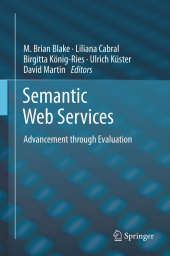 Neuerscheinungen 2014Stand: 2020-02-01 |
Schnellsuche
ISBN/Stichwort/Autor
|
Herderstraße 10
10625 Berlin
Tel.: 030 315 714 16
Fax 030 315 714 14
info@buchspektrum.de |

Brian Blake, Liliana Cabral, Birgitta König-Ries, Ulrich Küster, David Martin, Birgitta König- Ries
(Beteiligte)
Semantic Web Services
Advancement through Evaluation
Herausgegeben von Blake, Brian; Cabral, Liliana; König-Ries, Birgitta; Küster, Ulrich; Martin, David
2012. 2014. xiv, 362 S. 35 Tabellen. 235 mm
Verlag/Jahr: SPRINGER, BERLIN; SPRINGER 2014
ISBN: 3-642-42664-6 (3642426646)
Neue ISBN: 978-3-642-42664-3 (9783642426643)
Preis und Lieferzeit: Bitte klicken
Including a useful overview of the latest research on implemented SWS technologies, this volume details a variety of current semantic service approaches and provides valuable material that will enhance future SWS evaluation methodologies and techniques.
Over the last decade, a great amount of effort and resources have been invested in the development of Semantic Web Service (SWS) frameworks. Numerous description languages, frameworks, tools, and matchmaking and composition algorithms have been proposed. Nevertheless, when faced with a real-world problem, it is still very hard to decide which of these different approaches to use.
In this book, the editors present an overall overview and comparison of the main current evaluation initiatives for SWS. The presentation is divided into four parts, each referring to one of the evaluation initiatives. Part I covers the long-established first two tracks of the Semantic Service Selection (S3) Contest - the OWL-S matchmaker evaluation and the SAWSDL matchmaker evaluation. Part II introduces the new S3 Jena Geography Dataset (JGD) cross evaluation contest. Part III presents the Semantic Web Service Challenge. Lastly, Part IV reports on the semantic aspects of the Web Service Challenge. The introduction to each part provides an overview of the evaluation initiative and overall results for its latest evaluation workshops. The following chapters in each part, written by the participants, detail their approaches, solutions and lessons learned.
This book is aimed at two different types of readers. Researchers on SWS technology receive an overview of existing approaches in SWS with a particular focus on evaluation approaches; potential users of SWS technologies receive a comprehensive summary of the respective strengths and weaknesses of current systems and thus guidance on factors that play a role in evaluation.
Introduction.- Part I Results from the S3 Contest: OWL-S and SAWSDL Matchmaker Evaluation Tracks.- Overview of the S3 Contest: Performance Evaluation of Semantic Service Matchmakers.- SeMa2 - a Hybrid Semantic Service Matching Approach.- OPOSSUM: Indexing Techniques for an Order-of-Magnitude Improvement of Service Matchmaking Times.- Adaptive Hybrid Selection of Semantic Services: The iSeM Matchmaker.- SPARQLent: a SPARQL Based Intelligent Agent Performing Service Matchmaking.- Semantic Annotations and Web Service Retrieval: the URBE Approach.- SAWSDL Services Matchmaking using SAWSDL-iMatcher.- Self-Adaptive Semantic Matchmaking using COV4SWS.KOM and LOG4SWS.KOM.- Part II Results from the S3 Contest: Cross Evaluation Track.- Overview of the Jena Geography Dataset Cross Evaluation.- Evaluation of Structured Collaborative Tagging for Web Service Matchmaking.- Ontology Based Discovery of Semantic Web Services with IRS-III.- Part III Results from the Semantic Web Service Challenge.- Overview of the Semantic Web Service Challenge.- Loosely Coupled Information Models for Business Process Integration - Incorporating Rule-based Semantic Bridges into BPEL.- The XMDD Approach to the Semantic Web Services Challenge.- Service Offer Discovery in the SWS Challenge Shipment Discovery Scenario.- A Solution to the Logistics Management Scenario with the Glue2 Web Service Discovery Engine.- The COSMO Solution to the SWS Challenge Mediation Problem Scenarios- An Evaluation.- Part IV Results from the Web Services Challenge.- Overview of the Web Services Challenge (WSC): Discovery and Composition of SemanticWeb Services.- Effective QoS aware service composition based on forward chaining with service space restriction.- Semantics-basedWeb Service Composition Engine.- Efficient Composition of Semantic Web Services with End-to-End QoS Optimization.


